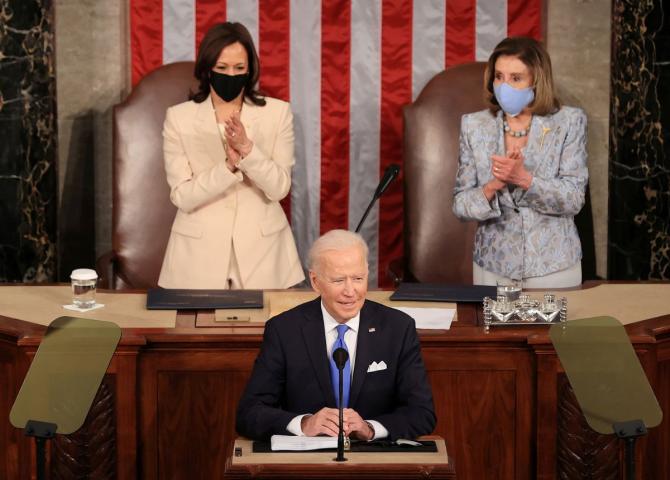The trust some people in India had that the Biden-Harris administration would be friendly to India has been eroded already, observes Ambassador T P Sreenivasan.

India's honeymoon with the Biden administration had not even begun when things began to go wrong, casting a shadow on a relationship which had held out many promises.
Commentators jumped to the conclusion that Republican presidents, even President Donald Trump, were more sensitive to India's aspirations and needs.
The two sides were quick to grab the low hanging fruit, the Quad, but India, becoming of a shy bride, did not go far enough to call a spade a spade.
Instead, Quad became a dialogue, not an instrument of action.
Perhaps, President Biden's disappointment came through when India expected help.
Things appeared calm, but the first shock came from the very waters earmarked for intense cooperation.
The commander of the US 7th Fleet made a shocking claim: 'On 7 April, 2021 USS John Paul Jones asserted navigational rights and freedoms... inside India's EEZ, without requesting India's prior consent.'
To add insult to injury, he added, 'India requires prior consent for military exercises or manoeuvres in its EEZ... a claim inconsistent with international law... This freedom of navigation operation (FONOP) upheld international law by challenging India's excessive maritime claims.'
The international law being quoted by the US was the Law of the Seas of 1982, which India had signed and the US had not!
Admiral Arun Prakash, a retired chief of the naval staff, was aghast at this development.
'In an atmosphere of rapidly warming Indo-US relations, this gratuitous public declaration, coming within weeks of the US-led Quad Leaders virtual meeting and on the heels of a major Indo-US naval exercise can only be seen as an act of breath-taking inanity,' he wrote.
India's consternation was evident in the protest it lodged with the Americans.
The ministry of external affairs said in a statement; 'We have conveyed our concerns regarding this passage through our EEZ to the Government of USA through diplomatic channels.'
India and the US have fundamental differences in coastal States' rights to stop foreign military ships from conducting military activities within their EEZ.
India had stated at the time of the ratification of the Law of the Sea that 'the provisions of the Convention do not authorise other States to carry out in the exclusive economic zone and on the continental shelf military exercises or manoeuvres, in particular those involving the use of weapons or explosives without the consent of the coastal State'.
China too had made similar declarations.
Not wanting to attribute anti-India motives to the US, it was helpfully suggested that the US action in India's EEZ was to convey a tough message to China that their claims of areas around the artificial islands in the South China Sea would be inadmissible.
This does not appear logical as no one hurts a friend to give a harsh message to an adversary.
Till today, there is no convincing reason for the US action.
Apparently, the US had done this before, but did not make a song and dance about it.
Equally inexplicable was President Biden's reaction to India's request for components of a badly needed vaccine in an unprecedented emergency in India, which has been characterised even by the US media as 'beyond crisis'.
India, having estimated that it had sufficient stocks of vaccine for itself, had exported Indian vaccines to as many as 92 countries as part of its vaccine diplomacy.
The US reaction was astounding as the expectation was that the US would immediately announce all possible help, leaving the details to be worked out.
But a US state department spokesperson said that the Biden administration's first obligation was to take care of the requirements of the American people and that 'It is not only in the US interest to see Americans vaccinated; but it is in the interests of the rest of the world to see Americans vaccinated'.
The reaction in India was not just one of disappointment, but of outrage that Biden acted against India's interests so soon after the formation of the Quad, which had pledged to work together against the pandemic.
In the light of the Quad agenda, the US position was unacceptable.
After a telephonic conversation between Modi and Biden, some amends were made, but not to the extent to satisfy the requirements of a strategic partner, if not an ally.
Strangely, Biden explained that he had changed his mind because India had extended assistance to the US in times of need.
No wonder the anti-US lobby went to town to declare that Biden had deliberately tried to undermine the Modi government.
The words of Biden echoed the 'America First' sentiment of his predecessor and not commitment to multilateralism.
The rising anti-Indian sentiment in the West was also seen in a statement by German Chancellor Angela Merkel on the Indian request for vaccine components.
'We now have a situation with India where, in connection with the emergency situation of the pandemic, we are worried whether the pharmaceutical products will still come to us,' she said.
She went on to say: 'Of course, we have only allowed India to become such a large pharmaceutical producer in the first place, also from the European side, in the expectation that this should then also be complied with. If that is not the case now, we will have to rethink.'
That was an unkind cut, not expected from a friend at a time of desperation.
The trust some people in India had that the Biden-Harris administration would be friendly to India has been eroded already, even though a massive effort is being mounted by the administration, the business community and Indian Americans to make amends.
Like Japan was rattled by 'Nixon shokku' when President Richard M Nixon made his historic visit to China in February 1972 India has had a mild 'Biden shock' from which recovery will depend on how things develop in larger issues like China, Russia and trade.
Ambassador T P Sreenivasan (IFS 1967) is a former Ambassador of India and Governor for India of the IAEA.
A frequent contributor to Rediff.com, you can read his fascinating columns here.
Feature Presentation: Aslam Hunani/Rediff.com











 © 2025
© 2025